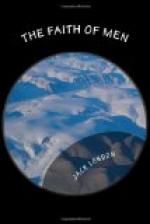Three hours later, numbed, exhausted, blathering like a lunatic, but still bailing, he went ashore on an ice-strewn beach near Cariboo Crossing. Two men, a government courier and a half-breed voyageur, dragged him out of the surf, saved his cargo, and beached the Alma. They were paddling out of the country in a Peterborough, and gave him shelter for the night in their storm-bound camp. Next morning they departed, but he elected to stay by his eggs. And thereafter the name and fame of the man with the thousand dozen eggs began to spread through the land. Gold-seekers who made in before the freeze-up carried the news of his coming. Grizzled old-timers of Forty Mile and Circle City, sour doughs with leathern jaws and bean-calloused stomachs, called up dream memories of chickens and green things at mention of his name. Dyea and Skaguay took an interest in his being, and questioned his progress from every man who came over the passes, while Dawson—golden, omeletless Dawson—fretted and worried, and way-laid every chance arrival for word of him.
But of this Rasmunsen knew nothing. The day after the wreck he patched up the Alma and pulled out. A cruel east wind blew in his teeth from Tagish, but he got the oars over the side and bucked manfully into it, though half the time he was drifting backward and chopping ice from the blades. According to the custom of the country, he was driven ashore at Windy Arm; three times on Tagish saw him swamped and beached; and Lake Marsh held him at the freeze-up. The Alma was crushed in the jamming of the floes, but the eggs were intact. These he back-tripped two miles across the ice to the shore, where he built a cache, which stood for years after and was pointed out by men who knew.
Half a thousand frozen miles stretched between him and Dawson, and the waterway was closed. But Rasmunsen, with a peculiar tense look in his face, struck back up the lakes on foot. What he suffered on that lone trip, with nought but a single blanket, an axe, and a handful of beans, is not given to ordinary mortals to know. Only the Arctic adventurer may understand. Suffice that he was caught in a blizzard on Chilkoot and left two of his toes with the surgeon at Sheep Camp. Yet he stood on his feet and washed dishes in the scullery of the Pawona to the Puget Sound, and from there passed coal on a P. S. boat to San Francisco.
It was a haggard, unkempt man who limped across the shining office floor to raise a second mortgage from the bank people. His hollow cheeks betrayed themselves through the scraggy beard, and his eyes seemed to have retired into deep caverns where they burned with cold fires. His hands were grained from exposure and hard work, and the nails were rimmed with tight-packed dirt and coal-dust. He spoke vaguely of eggs and ice-packs, winds and tides; but when they declined to let him have more than a second thousand, his talk became incoherent, concerning itself chiefly with the price of dogs and dog-food, and such things as snowshoes and moccasins and winter trails. They let him have fifteen hundred, which was more than the cottage warranted, and breathed easier when he scrawled his signature and passed out the door.




